
The geopolitical tension between Israel and Iran has long been a source of instability in the Middle East, a region already fraught with historical conflicts. In recent months, the situation has escalated, drawing the attention of global markets, particularly the precious metals market. Gold, often regarded as a safe-haven asset during times of uncertainty, is especially sensitive to geopolitical events. As the possibility of a military conflict between Israel and Iran looms, the probable impact on gold prices becomes a focal point for investors worldwide. This article analyses the potential ramifications of this tension on gold and platinum prices, with a special emphasis on the global economy.
Understanding the Israel-Iran Tensions
The animosity between Israel and Iran is not a recent development. It stems from a complex history of ideological, religious, and political differences. However, in recent years, this enmity has taken on a more perilous dimension, with both countries engaging in proxy wars, cyberattacks, and threats of direct military confrontation. The situation is further aggravated by Iran’s nuclear ambitions, which Israel perceives as a direct threat to its existence.
The international community, particularly the United States and Europe, has tried to mediate and prevent the situation from spiralling out of control, but with limited success. The possibility of Iran attacking Israel, whether through direct military action or proxy forces, is not far-fetched, especially considering the volatile nature of the Middle East.
The Role of Gold as a Safe-Haven Asset
Gold has historically been a preferred investment during periods of geopolitical instability. When the global political landscape becomes uncertain, investors often flock to gold to protect their wealth. This phenomenon is primarily because gold retains its value even when other assets, such as equities or currencies, become volatile.
The current tensions between Israel and Iran have already led to some fluctuations in gold prices, as investors brace for potential conflict. However, should Iran attack Israel, the impact on gold prices is expected to be far more significant.
Probable Impact on Gold Prices if Iran Attacks Israel
If Iran were to launch an attack on Israel, the immediate reaction in the global markets would likely be one of panic. Stock markets around the world could see sharp declines as investors seek safer assets, leading to a significant surge in demand for gold. Historically, during similar geopolitical crises, gold prices have spiked, sometimes reaching new all-time highs.
The Middle East is a critical region for the global energy supply, with a significant portion of the world’s oil passing through the Strait of Hormuz, a narrow waterway that Iran has previously threatened to block in the event of a conflict. A disruption in oil supplies could lead to a sharp rise in oil prices, further exacerbating economic instability worldwide. The resulting uncertainty would likely drive gold prices even higher, as investors look to hedge against inflation and currency devaluation.
Experts predict that in the event of a full-scale conflict between Israel and Iran, gold prices could surge beyond their previous highs, potentially reaching $2,500 to $3,000 per ounce. This would represent a significant increase from current levels, reflecting the intense demand for safe-haven assets during times of extreme uncertainty.
The Broader Economic Impact and Its Influence on Gold Prices
The potential conflict between Israel and Iran could have far-reaching consequences for the global economy. A military confrontation in the Middle East could disrupt global trade, particularly in energy and commodities. This disruption could lead to higher inflation rates worldwide, as the cost of goods and services rises due to increased transportation and production costs.
Higher inflation typically benefits gold prices, as investors seek to protect their purchasing power. Additionally, central banks may respond to the economic fallout by lowering interest rates or implementing more aggressive monetary policies, further boosting the appeal of gold as an investment.
Moreover, the potential for a protracted conflict could lead to prolonged economic instability, which would keep gold prices elevated over an extended period. The longer the conflict drags on, the more likely it is that gold will continue to see increased demand from both institutional and individual investors.
Impact on Platinum Prices
While gold is often the focus during times of geopolitical uncertainty, other precious metals, such as platinum, also see price movements in response to global events. Platinum, which is used in various industrial applications, including automotive catalytic converters, is sensitive to changes in the global economy.
In the event of a conflict between Israel and Iran, platinum prices could also see an increase, although the dynamics would differ from those affecting gold. Disruptions in global trade and higher energy costs could lead to supply chain issues for industries that rely on platinum, driving up prices. However, unlike gold, platinum does not have the same status as a safe-haven asset, so the price increases may not be as dramatic.
Conclusion: Preparing for Uncertainty
The tension between Israel and Iran is a critical factor to watch for anyone invested in the precious metals market. As the situation develops, the potential impact on gold prices could be substantial, especially if the conflict escalates into a full-scale war. Investors should be prepared for significant volatility in the markets, with gold likely to see strong demand as a safe-haven asset.
While predicting the exact movement of gold prices is challenging, it is clear that any escalation in the Israel-Iran conflict would likely push prices higher, potentially to unprecedented levels. Similarly, platinum prices could also rise, though the extent of the increase would depend on the broader economic impact of the conflict.
In summary, the probable impact on gold prices in light of the current tension between Israel and Iran is profound. Investors should closely monitor geopolitical developments and consider the role of gold in their portfolios as a hedge against uncertainty. As the world watches the Middle East with bated breath, the precious metals market stands poised to react to any significant changes in the geopolitical landscape.